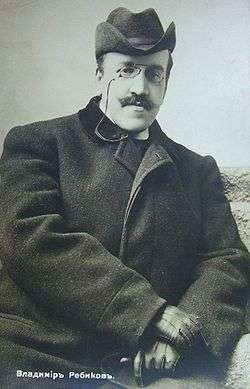Vladimir Rebikov

Vladimir Ivanovich Rebikov (Russian: Влади́мир Ива́нович Ре́биков, Vladi'mir Iva'novič Re'bikov; born May 31 [OS May 19] 1866 - Krasnoyarsk, Siberia, Russia — died October 1, 1920 - Yalta, Crimea, Ukraine) was a late romantic 20th-century Russian composer and pianist.
Biography
Rebikov began studying the piano with his mother. His sisters also were pianists. He graduated from the Moscow University faculty of philology. He studied at the Moscow Conservatory with N. Klenovsky, a pupil of Peter Tchaikovsky, and then for three years in Berlin and Vienna with K. Meyerberger (music theory), O. Yasch (instrumentation), and T. Muller (piano). Rebikov taught and played in concerts in various parts of the Russian Empire: Moscow, Odessa, Kishinev, Yalta, as well as in Berlin, Vienna, Prague, Leipzig, Florence and Paris, where he met Claude Debussy, Oscar Nedbal, Zdenek Needly, and others. Rebikov settled in Yalta in 1909.
Legacy
Early works suggest the influence of Peter Tchaikovsky. He wrote lyrical piano miniatures (suites, cycles, and albums), children's choruses and songs. One of his vocal cycles is called Basni v litsach (The Fables in Faces) after Ivan Krylov. He wrote also a stage work Krylov's Fables (c. 1900). His children's music is the most notable of all his works. He continued the Russian penchant for the whole tone scale, using it in the piece Les demons s'amusent, included into the melomimic suite Les Rêves (Dreams, 1899).
He used new advanced harmony such as seventh and ninth chords, unresolved cadences, polytonality, and harmony based upon open fourths and fifths. He also was experimenting with novel forms, for instance, in his piano pieces, Mélomimiques Op. 10 (1898), and Rythmodéclamations in which music and mime are combined, and he introduced a type of musical pantomime known as "melo-mimic" and "rhythm-declamation" (see melodeclamation). His orchestral and stage works include more than ten operas, such as Yolka (Ёлка - The Christmas Tree), and two ballets.
Quotations
“Rebikov was already a forgotten figure by the time of his death at age 54. He was bitter and disillusioned, convinced wrongly that composers such as Debussy, Scriabin, and Stravinsky had made their way into public prominence through stealing his ideas. Ironically Rebikov is best known by way of his insubstantial music in salon genres. Rebikov's role as an important early instigator of twentieth-century techniques deserves to be more widely recognized.” (Uncle Dave Lewis, Allmusic)
Operas
- V grozu (В грозу — In the Storm, Op. 5, after Vladimir Korolenko 1863, premiered 1894, Odessa)
- Bezdna (Бездна — Abyss after Leonid Andreev, 1907)
- Zhenshchina s kinzhalom (Женщина с кинжалом — The Woman with a Dagger after Arthur Schnitzler, 1910)
- Dvoryanskoye Gnezdo (Дворянское Гнездо — A Nest of Nobles, Op. 55, Op. 55 after Ivan Turgenev, 1916)
- Yolka (Ёлка - The Christmas Tree after Fyodor Dostoevsky, Hans Christian Andersen and Gerhart Hauptmann, 1900, staged 1903).
Bibliography
Catalogue of Rebikov's Works, Moscow, 1913 Tompakova, O.: Rebikov, entry in Creative Portraits of Composers, Moscow 1989 (in Russian).
External links
- Biography at answers.com
- Song texts
- Mir Imen (Russian)
- Karadar (German)
- Free scores by Vladimir Rebikov at the International Music Score Library Project